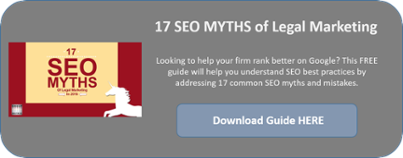Whether you are attempting to tackle SEO on your own or you’re working with a professional, it’s likely you may fall victim to these common SEO mistakes.
In an ever-changing digital landscape, it’s easy to get lost or miss an update. Google’s Panda and Penguin algorithm updates quite literally stopped SEO professionals in their tracks, forcing them to exchange their keyword and link-building obsession for a focus on quality and content.
Since the many shifts from Google, among other changes on the web many legal marketers find themselves at an impasse. They’re unsure whether SEO is a waste of time and what is actually necessary to move the needle. These four tips will help you understand how SEO works for legal marketing and should help you begin to recognize some of the common myths and assumptions about SEO.
If you are interested in learning more, you can download our free guide including all of the common SEO myths below.
Myth #1: The end goal is all about ranking
Although there is still a relationship between search results and clickthrough rates, search results now include rich text/snippets, enabling results below the top-three to see increased clickthrough rates. Though some studies still show that searchers do favor the top results, you could rank very well for a term, see a huge amount of traffic to your site and not complete a single conversion. Therefore, in the world of legal marketing, conversions outweigh ranking. The end goal is to convert a lead into a client, thus bringing us full circle with content-driven SEO.
Myth #2: Search engines match the keywords searched to the keywords of a webpage
Many SEO professionals don’t realize Google no longer aims to match keywords typed into the search engine with exact keywords on a web page. Instead, the search engine seeks to identify the intent of the searched terms so it can match that intention with quality, accurate content. According to Sam Lowe, Marketing Assistant at the Weidert Group, “Don’t waste your time trying to find the perfect couple of keywords to use on your site over and over. First of all, Google hates it when you over-optimize for machines. Secondly, searches will use a vast mix of words and phrases to find what they’re looking for. The content on your site should be varied enough to meet that search criteria while still sticking to one overarching theme”. Thus, search engines will continue to punish you for overusing keywords, but it isn’t likely to punish you for underusing keywords.
Myth #3: Your homepage needs to be maxed out on content
For years, it’s been suggested that the best way to increase your ranking on search engines is by filling your homepage with as much content as possible. Instead of focusing on increasing the amount of copy and keywords, use your homepage to make the best first impression on a prospective client. The homepage is like the front office – if it looks cluttered, disorganized or is overwhelming, you risk losing your client before they ever get past that first look. You should include images, or perhaps a video reel if you’ve shot commercial’s, done any TV appearances, or have testimonials of your firm. The copy on your homepage should be long enough for clients to understand who you are, what you do, where you’re located (especially if you have multiple offices) and what the next steps for clients would be. It should also be very easy for them to find your contact information (we recommend putting your phone number at the top of the page), and it should be optimized for mobile devices. Your homepage should leave visitors feeling like they’ve found the help they need, not feeling overwhelmed or confused.
Myth #4: SEO focuses on search engines, not search experience
Historically, SEO was about getting found, but with Google’s algorithm updates it’s becoming more and more about how users engage with your content. It’s so much more than simply targeting keywords toward search engines. You need to design SEO around users first and the search engines second. Your goal is to sign a new client, so your focus needs to be engaging them on your home page and once they click through, keeping them engaged and interested in what your firm has to offer. The content you publish should be personal, relevant and up to date. You also want to ensure the site is user friendly and easy to navigate, so that both potential clients and Google’s crawlers will have no problem finding the content they need. If you provide clear, engaging information you’ll find much greater success in converting your leads to future clients.
We hope these tips help you begin to think about SEO a little differently. If you’d like to learn more Contact Us or download our free guide here:
Best,




